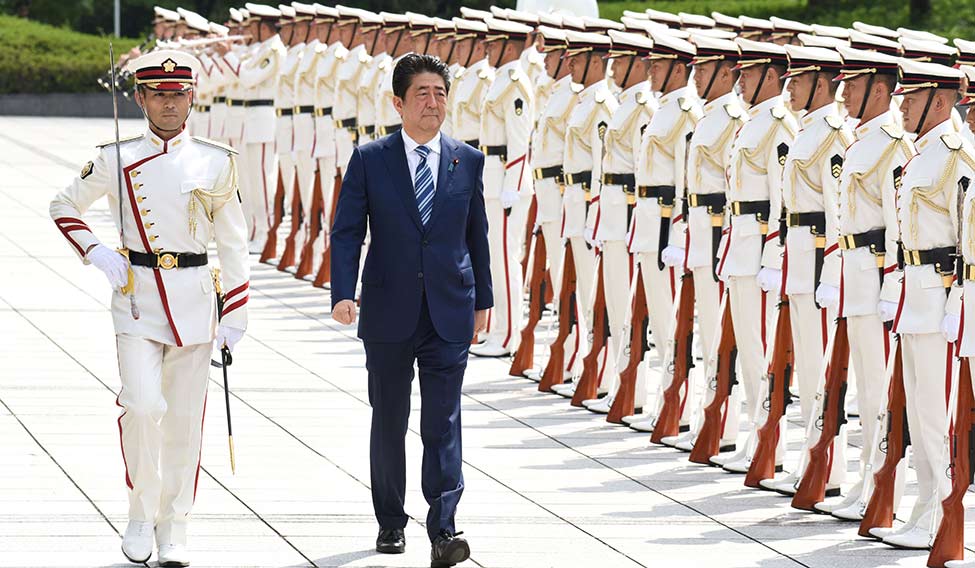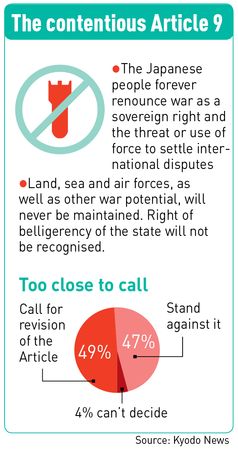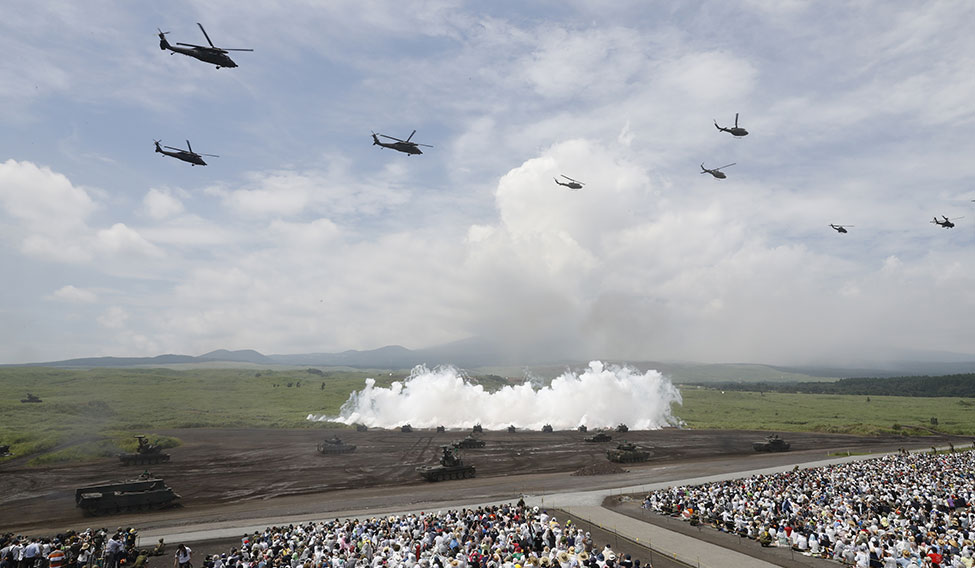On the morning of August 29, I was at Tokyo Station, waiting to board a bullet train to the city of Kanazawa, in the Ishikawa prefecture. Well aware of Japanese fastidiousness with punctuality, particularly the legendary promptness of its Shinkansen trains, I had arrived well ahead of the 8.36am departure time. Imagine my surprise, and disappointment, when the train arrived more than 20 minutes late.
As it turned out, there was an extraordinary reason for this tardiness. Earlier that morning, a couple of minutes before 6am, North Korea had hurled a ballistic missile directly over Japan. It flew over the northern island of Hokkaido and landed in the Pacific Ocean. The Japanese government warned citizens living beneath the missile’s path to take cover, temporarily halted bullet trains and interrupted television programmes to announce the news.
“We will do our utmost to protect people’s lives,” said Japan’s Prime Minister Shinzo Abe. “North Korea’s reckless action of launching a missile that passed over Japan is an unprecedented, serious and grave threat.” Other world leaders roundly condemned North Korea’s actions. Abe had a 40-minute phone call with US President Donald Trump, who announced that all options to respond to North Korea were on the table. China said that the situation had reached the tipping point, and South Korea responded with bombing drills.
But North Korean leader Kim Jong-un was clearly not cowering in a corner. Instead, he appeared ecstatic, and pictures of him beaming, surrounded by his military brass, were released by the North Korean media. A little more than a fortnight later, on September 15, he tested another of his toys, again sending a ballistic missile over Japan, into the Pacific Ocean.
Kim’s chief enemies, the USA and South Korea, responded by displaying their might with impressive military drills. On September 19, in a speech at the UN in New York, Trump said: “Rocket Man is on a suicide mission. If the US is forced to defend itself or its allies, we will have no choice but to totally destroy North Korea.”
Japan is in a unique position. Even though its territory is the one most affected by Kim’s recent actions, it is unable to react militarily. Or even with overt rhetoric. The simple reason is that Japan’s actions are restricted by its constitution. Described as the ‘post-war’ or ‘peace’ constitution, it is best known for its contentious Article 9, in which Japan renounces its right to wage war or even to have any land, sea or air forces. Since its adoption in 1947, the constitution has never been amended; the reason being that as per Article 96, any amendment or revision must gain the support of two-thirds of the members of both houses of the Japanese parliament, the National Diet. It must then be approved by a majority of voters in a referendum. To date, revisions for many articles have been advocated but they have been unable to get the support of two-thirds of both houses.
 Focusing on defence: Japan’s Prime Minister Shinzo Abe reviews a guard of honour at the defence ministry in Tokyo, on September 11 | AFP
Focusing on defence: Japan’s Prime Minister Shinzo Abe reviews a guard of honour at the defence ministry in Tokyo, on September 11 | AFP
Abe has been a vocal advocate of a revision of Article 96; the motivation, of course, being the revision of Article 9. He has been slowly pushing for constitutional revision that will permit Japan to increase its military capabilities. But it has not been an easy road.
In 2015, amidst protests, Abe’s government circumvented Article 96, and the Diet approved a reinterpretation of the Self-Defence Forces (SFD). Established in 1954 as a unified military force, it has, over the years, been involved in various international peacekeeping operations. It gave the SFD more powers, allowing it to defend other allies in case of war being declared upon them. In the current scenario, this means that Japan cannot directly attack North Korea, but if North Korea were to go to war with Japan’s ally, the US, Japan could militarily aid it.
Since the 1945 bombings of Hiroshima and Nagasaki, anti-nuclear sentiment remains strong in Japan. According to a poll jointly conducted in June and July by the Public Opinion Research Centre of Tokyo and Hankook Research of Seoul, 74.7 per cent of 1,000 Japanese respondents said they opposed the idea of Japan possessing nuclear weapons. In South Korea, however, 67.2 per cent support going nuclear.
In May, for the first time, Abe put a clear time frame on revising the pacifist constitution and said that he hoped there would be a new version in effect by 2020. “I believe that we must establish the status of the SDF explicitly in the constitution during our generation’s lifetime, and leave no room for contending the SDF could be unconstitutional,” said Abe, in a video message marking the 70th anniversary of the constitution.
In recent years, the interest in and fascination for the SDF have been increasing. On August 27, two days before the first ballistic missile flew over Japan, there was a festive mood at the SDFs live-fire drills conducted at the foothills of Mount Fuji. More than 26,000 people attended the weekend event, and applications for tickets were oversubscribed by almost six times this year. Children dressed in military fatigues looked through binoculars at planes in the sky, and bought military-themed cookies, t-shirts and toy tanks at street stalls.
The Abe cabinet’s approval rating surged to 44 per cent from a low of 35 per cent in July in a monthly poll conducted during September 8-10 by NHK—Japan’s national public broadcasting organisation—showing approval to the cabinet’s handling of the North Korean crisis. A poll conducted on the same days by Japanese newspaper Yomiuri Shimbun, showed an approval rating of 50 per cent for Abe’s cabinet, an increase of eight percentage points from the previous survey.

On Septmber 11, Abe reiterated the importance of boosting the country’s defences. “No one else will protect you if you don’t have the mindset of protecting yourself,” said Abe, in a speech to senior officers of the SDF. “We have to take all appropriate measures against [incidents like] North Korea’s missiles.”
So, are the Japanese fearing for their lives? Are they keen on a revision of the pacifist constitution?
Author and columnist Pallavi Aiyar, who lives in Japan, says: “Despite the growing threats from North Korea and China, the majority of Japanese remain pacifist and opposed to overt militarisation. Abe’s attempts to build a more muscular military role for the country have so far been unpopular and his desire for constitutional revision, to make it more easy to have an aggressive military, were a major reason for a plunge in his approval ratings earlier this year. But North Korea’s recent actions are playing into Abe’s hands. While militarism remains unpopular, North Korea’s testing and the unreliability of the US as an ally will inevitably lead to upping defences. Newspapers are full of experts calling for it.”
Opinions seem to differ among generations. Tetsuji Totsune, 74, managing director of seafood company Maple Foods, says: “North Korea is a big headache. However, most Japanese don’t feel threatened. No change in the peace constitution is best.” His view is supported by a Japanese man who works in India, whose parents were severely affected by the atomic bomb in Hiroshima: “Abe is very keen on changing Article 9, but people from my generation are strongly leftist.”
Gonta Kashio, 46, managing director of a pharmaceutical company in Japan, feels differently. “I am an advocate of revision and expanded reinterpretation of Article 9,” says Kashio. “Japan needs to stop clinging to the United States’ skirt for support, and grow up and defend itself. As for millennials, they are viewed as being apathetic—owing to their being brought up in a cocoon of richness and entitlement—by bringing up the restoration of military service as a topic for hot debate.”
Or, maybe, some of them are just not interested. “Frankly, this is not one of the most discussed topics among my friends,” says Ai Fujita, 33, an assistant manager at a Tokyo company. “It is said that we [her generation] have been too spoiled with peace in Japan. I am aware that the North Korean situation is of big concern internationally, and my friends abroad assume that we must be worried, but in reality, we don’t feel threatened or even talk about it. Unfortunately, the young generation in Japan is not very interested in politics. I think it is because, fortunately, our lives are quite okay as they are.”
Matthew Fryett, 33, from the UK, who has been living and working in Tokyo for the past six years, says: “Over the course of the week, I meet construction workers (all male, 20-40 years), and students of all ages, including children, in my judo class. None of them have ever commented about the current situation with North Korea, or about the military. When asked, they barely seem interested in the issue; definitely, nobody seems scared. Geographically, Japan is so close to North Korea, that I think it has grown accustomed to its regular sabre-rattling, and people don’t easily get stirred up about it.”
Fryett feels that pacifism has served Japan well. “In the seven decades since World War II, Japan has benefited greatly from the lack of any serious military involvement, spending money on infrastructure and public services that other countries spend on defence. The end result is a safe country with a very good quality of life.”
He says the hard-core pacifists are the older generation, who still remember the World War and its repercussions. But, this generation is slowly dying off, and the country is losing its most vocal proponents for peace. “Though there is not much popular support for a stronger military in Japan right now, as memories of World War II fade, there is more of a chance that such support might grow,” he says.
Media reports say that Abe plans to dissolve the lower house on September 28—when an extraordinary session of the Diet is scheduled to begin—and call a snap election. A key focus of the election will be whether political coalitions wanting to revise the pacifist constitution will be able to retain more than two-thirds of the 465-seat chamber. Currently, pro-revision forces occupy more than two-thirds of both chambers, but are yet to reach a consensus on which article should be revised and how.






